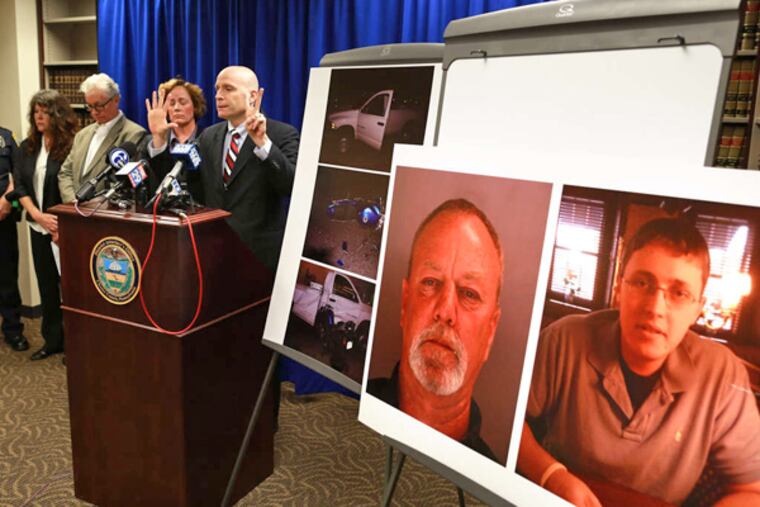Stopping repeat DUI offenders
By Louis Lombardi Like in a game of Russian roulette, Robert Landis time after time positioned himself behind the steering wheel of his car - despite the fact that he was inebriated. And time after time, he was arrested.

By Louis Lombardi
Like in a game of Russian roulette, Robert Landis time after time positioned himself behind the steering wheel of his car - despite the fact that he was inebriated. And time after time, he was arrested.
Yet being arrested eight times since 1981 did not deter Landis from his one-man crime wave. That, unfortunately, was not stopped until he took a life. This month, Landis pleaded guilty to homicide by vehicle in last year's death of 24-year-old Liam Crowley.
Chester County District Attorney Thomas Hogan is calling for higher mandatory minimum sentences for repeat drunken drivers. This approach would help after the fact, but can we not come up with solutions before there is a death?
We must understand that it is the behavior that needs to be controlled. We can't just legislate on results of this behavior, as people who drink and drive do not think that they are the one who will take a life. And, of course, when they do, it is too late to undo the damage.
Are we as a society so handcuffed that a person bent on breaking the law on a continuing basis - and placing the lives of others at risk - cannot be stopped?
Intoxicated driving exacts a great toll on our country. Nationally, there are about 10,000 fatalities a year as a result of drunken driving. Approximately 400 are killed annually in Pennsylvania. Those statistics don't include the injured.
It's not as if law enforcement officials are not trying to deal with this problem. In Pennsylvania, about 50,000 people a year are arrested for drunken driving, with nearly a third of those arrests involving repeat offenders.
So if arresting offenders will not solve the problem, and increasing the penalties will only address the issue after a death has occurred, what is the answer? We can start by looking at the civil code. We should institute forfeiture action against anyone who uses his car in such a manner and remove the vehicle from his possession - because it was used as an instrument of a crime.
Civil forfeiture is not new. Many jurisdictions, including Pennsylvania, use it for a myriad of crimes. This concept just needs to be expanded across the commonwealth to include those who drive their cars while intoxicated.
What makes civil forfeiture such an attractive option is that it is not tied to the criminal prosecution of a case. We would not have to wait for that process to play out. Upon an arrest for drunken driving, the vehicle would be kept in police custody and a parallel (but separate) action would be initiated in civil court to give the government the right to keep the car permanently. If this policy had been in effect after Landis' previous arrests, he might not have killed anyone. He would have had no car to drive - no car, no DUI, no death.
Think of it this way: If all those people arrested for drunken driving had misused a firearm instead of a car would we give them their guns back? Of course not. So why are we giving cars back to serial drunken drivers?
Our criminal code is designed to control aberrant behavior. Conduct that falls below these standards will be punished. However, when the criminal code is ineffective in controlling behavior, we need to look elsewhere to protect ourselves against those hell-bent on causing mayhem.
Using the civil code and forfeiture actions would be another tool in this battle against drunken driving. The more options we have to use when confronting a problem, the more likely we are to prevail.
You've heard the saying: Fool me once, shame on you; fool me twice, shame on me. But eight times?
Enough is enough. We must stop the madness before another life is lost.